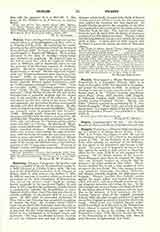

Picquet, FRANCOIS, a celebrated Sulpician missionary in Canada, b. at Bourg, Bresse, France, December 4, 1708; d. at Verjon, Ain, France, in 1781. He entered the Seminary of Lyons (1727), where he was ordained deacon in 1731. At the Seminary of St. Sulpice in Paris, after winning his doctorate at the Sorbonne, he was raised to the priesthood, and became a Sulpician. The same year he begged to be sent to Canada, and in the month of July arrived at Montreal, where for five years (1734-9) he was engaged in the ministry. On the Indian mission of the Lac-des-Deux-Montagnes (now Oka), he acquired the Algonquin and Iroquois tongues so perfectly that he surpassed the ablest orators of these tribes. His influence enabled him to win a large number of these savages to the true Faith. The Lake mission became very populous: Nipissings, Outaouois, Mohawks, and Hurons crowded alongside the Algonquins and Iroquois. Picquet fortified this Catholic center against the pagan tribes, and erected the Calvary which still exists, with its well-built stations stretching along the mountain side facing the lake. In the intercolonial war between France and England (1743-8), the Indian allies of these two powers came to arms. Due to the influence of their missionary the Five Nations, hitherto allies of the English, remained neutral, while the other savages carried on a guerilla war in New England or served as scouts for the French troops. When peace was restored, Picquet volunteered to establish an Indian post on the Presentation River, whence he spread the Gospel among the Iroquois nations, as far as the Indians of the West. Founded on June 1, 1749, this post became the Fort of the Presentation in the following year; from it arose the town of Ogdensburg, New York.
In 1751 Picquet traveled round Lake Ontario to gather into his mission as many Iroquois as possible, and succeeded in establishing 392 families at the Presentation. In 1752 Msgr. de Pontbriand, the last French Bishop of Quebec, baptized 132 of them. A banner, preserved in the church of Oka, perpetuates the souvenir of this event, and the memory of the fidelity of the Five Nations to the cause of France, for, in the course of the Seven Years’ War, it floated side by side with the Fleur-de-lis on many a battle-field. In 1753 Picquet went to France and presented to the minister of the Navy a well-documented memorandum concerning Canada, in which he pointed out the best means for preserving that colony for the French Crown. Hardly had he returned to Canada (1754) when hostilities were resumed. He directed his savages against the English, whom he considered as much the enemies of Catholicism as of France, and for six years accompanied them on their expeditions and into the field of battle. “Abbe Picquet was worth several regiments”, said Governor Duquesne of him. The English set a price on his head. When all hope of the cause was lost, by the order of his superiors who feared he might fall into the hands of the English, Picquet returned to France, passing thither through Louisiana (1760). He was engaged in the ministry in Paris till 1772. He then returned to his homeland, Bresse, and was named canon of the cathedral of Bourg, where he died.
A. FOURNET

